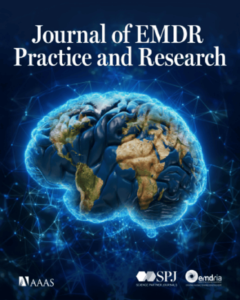Concomitant psychotropic medication is associated with reduced outcomes of trauma-focused psychotherapy for post-traumatic stress disorder (Psychotherapy and Psychosomatics)
This study emulated target trials to examine the association between psychotropic co-medication at treatment onset and psychotherapy outcomes in a real-world PTSD cohort.
Read MoreKetamine Assisted EMDR Therapy™ for PTSD: Investigating the synergistic effects of pharmacotherapy and psychotherapy (European Journal of Psychotraumatology)
This study examined whether incorporating low-dose sublingual ketamine into EMDR therapy reduces PTSD symptom severity and functional impairment in individuals with PTSD.
Read MoreBrief intensive EMDR therapy with rotating therapists: Experiences of adults with mild intellectual disability or borderline intellectual functioning, PTSD, and severe behavioural problems (European Journal of Trauma & Dissociation)
This study explored the experiences of individuals with mild intellectual disability or borderline intellectual functioning, PTSD, and severe behavioural problems, with brief Intensive EMDR therapy delivered by a team of rotating therapists.
Read MoreThe effectiveness of eye movement desensitization and reprocessing (EMDR) therapy in treating posttraumatic stress disorder among ICU healthcare professionals in Cameroon: A quasi-experimental study (African Journal of Clinical Psychology)
This study aimed to evaluate the effectiveness of EMDR therapy in treating PTSD among ICU healthcare professionals in Cameroon.
Read MoreFrontliners narratives: Qualitative insights into EMDR group therapy during COVID-19 (European Journal of Psychotraumatology)
This study investigated the experiences of frontline professionals who underwent EMDR-IGTP during the first wave of the pandemic, to offer insight for psychotherapists conducting emergency groups.
Read MoreTreating complex PTSD with schema therapy, ImRs and EMDR: A review and case study (European Journal of Psychotraumatology)
This case study evaluates the effectiveness of a combined therapy approach integrating ST, ImRs, and EMDR for treating CPTSD.
Read MoreEstablishing fidelity, acceptability, feasibility, and efficacy of Urdu translated single-session EMDR integrative group treatment protocol for ongoing traumatic stress among adolescents: A randomized controlled trial (Journal of EMDR Practice and Research)
This article aimed to establish a translation of EMDR-IGTP-OTS in Urdu for Pakistani adolescents who have experienced trauma and to demonstrate efficacy in reducing psychological distress.
Read MoreImpact of EMDR on posttraumatic stress disorder symptoms among urban refugees in Nairobi, Kenya (International Journal of Clinical Science and Medical Research)
The study examined the impact of EMDR on PTSD symptoms among a select group of urban refugees seeking services at an international non-governmental organization in Nairobi.
Read MoreNuances in the memory undermining effects of EMDR and imagery rescripting (Current Opinion in Psychology)
Authors voice opinions and concerns about psychological treatments that might create false memories.
Read MoreDoes treating emotional memories come at a price? Effects of single-session EMDR, imaginal exposure, and imagery rescripting on forced-choice recognition of event details in healthy adults (Behaviour Research and Therapy)
This laboratory study addressed concerns of impaired memory accuracy in trauma treatment, and tested whether a single session of EMDR, IE, or ImRs affects forced-choice recognition in healthy adults.
Read MoreThe ‘reducing psychosis risk by targeting trauma’ trial: Protocol of a feasibility randomised controlled trial of trauma-focused cognitive behavioural therapy and eye movement desensitisation and reprocessing therapy for people with at-risk mental states (Early Intervention in Psychiatry)
This trial aims to evaluate the feasibility of conducting a future randomised controlled trial (RCT) to determine the efficacy of EMDR therapy and trauma focused cognitive behavioural therapy (TF-CBT) in people with at-risk future psychosis.
Read MoreA preliminary efficacy study of eye movement desensitisation and reprocessing therapy in reducing epilepsy-related anxiety (Epilepsy & Behavior)
This study examined whether EMDR therapy reduces anxiety in people with epilepsy-related anxiety.
Read More


